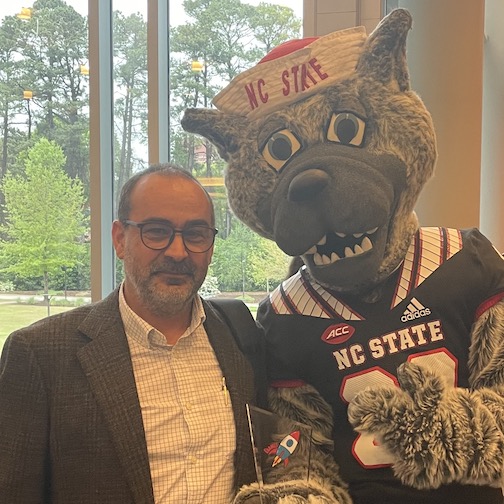José M. Bruno-Bárcena

Professor of Microbiology
Coordinator of the Microbial Biotechnology Concentration
Department of Plant and Microbial Biology
Thomas Hall 4554
jbbarcen@ncsu.edu WebsiteBio
Dr. Bruno-Barcena is a translational industrial microbiologist with an effective research program, which includes strong collaborative relationships within the biotechnology industry, and a passion for bioprocess workforce training. As example, he has designed cutting-edge process intended for the production and preservation of a probiotic multi-strain cocktail, later commercialized and currently on the market (Bioflora-Biosidus – Arg). Also just before joining NCSU, he implemented a Biotechnological Pilot Plant, facility successfully spun-off to the private sector (ADM Biopolis S.L. – Spain). During the last two decades at NCSU, has contributed to the teaching, training, and the service mission of the university including inter and intra college teaching efforts with interactions at all levels, from undergraduate and graduate students to industry outreach programs including training of professionals and FDA inspectors. His research projects have focused on microbial physiology, exploring bioreactor technology and traditional fermentation processes using renewable carbon sources. The last 25 years he has produced over 38 peer-reviewed publications, edited a book and 6 book chapters, and 8 invention disclosures.
Research Interests
Industrial Microbiology and Bioprocessing of high-value added products including Microbial Communities, Probiotics, Prebiotics, Enzymes, Chemicals, and Biofuels
There is a critical need for the systematic identification and testing of dynamic community behavior as well as gene modulated states participating in the enhancement of cellular stress resistance of cultures. In our laboratory we use the new era of bioprocessing and genomic tools that make it possible control physiological states and to identify point mutations, insertions, deletions and/or translocations that have occurred in offspring strains following defined selection processes. In the near future, this comparative physiological/genetic approach will provide valuable insights for identifying gene combinations and new biochemical pathways, both playing a role in community microbial cross-feeding metabolism. This information may be applied to further improve microbial production or to understand dysbiosis by using strategic strain combinations and/or strain modifications. Our primary research interests are the genetic and physiological study of Gram positive organisms while investigating different but complementary areas with a focus on functional probiosis and bioenergy. Thus far our bioprocessing research has generated technology, peer-reviewed publications, and intellectual property to be directly implemented and translated into the generation of biofuels and functional foods. We have dedicated significant amounts of time towards implementing these new overlapping bioprocessing research areas that target prime university interests.
Teaching
I teach several classes at North Carolina State University. These include “Microbial Biotechnology” (MB 455/555) during Spring and MB 420/520 (“Fundamentals of Cell Culture Biotransformations”) during Fall. Both courses are targeted at microbiology majors or non-majors and to graduate students with interest in Biotechnology and Industrial Microbiology.
Education
B.S. (Five years Degree) Biological Science Oviedo University 1991
Ph.D. Biological Science Tucuman University 1997
Area(s) of Expertise
Industrial Microbiology of high-value products including Microbial Communities, Probiotics, Prebiotics, Enzymes, Chemicals, and Biofuels
Publications
- Non-stochastic reassembly of a metabolically cohesive gut consortium shaped by N-acetyl-lactosamine-enriched fibers , Gut Microbes (2024)
- Structural analysis and functional evaluation of the disordered ß-hexosyltransferase region from Hamamotoa (Sporobolomyces) singularis , FRONTIERS IN BIOENGINEERING AND BIOTECHNOLOGY (2023)
- Application of raw industrial sweetpotato hydrolysates for butanol production by Clostridium beijerinckii NCIMB 8052 , BIOMASS CONVERSION AND BIOREFINERY (2022)
- Randomized placebo-controlled trial of feline-origin Enterococcus hirae probiotic effects on preventative health and fecal microbiota composition of fostered shelter kittens , FRONTIERS IN VETERINARY SCIENCE (2022)
- Safety and Modulatory Effects of Humanized Galacto-Oligosaccharides on the Gut Microbiome , FRONTIERS IN NUTRITION (2021)
- The pleiotropic effects of prebiotic galacto-oligosaccharides on the aging gut , MICROBIOME (2021)
- The pleiotropic effects of prebiotic galacto-oligosaccharides on the aging gut (vol 9, 31, 2021) , MICROBIOME (2021)
- Accelerated Biodegradation of the Agrochemical Ametoctradin by Soil-Derived Microbial Consortia , Frontiers in Microbiology (2020)
- An iterative approach to improve xylose consumption by Clostridium autoethanogenum: From substrate concentration to pH adjustment , Biomass and Bioenergy (2020)
- Draft Genome Sequence of Lactobacillus rhamnosus NCB 441, Isolated from Egyptian White Domiati Cheese , Microbiology Resource Announcements (2020)